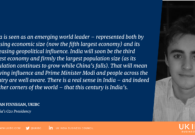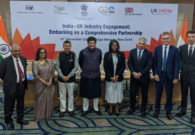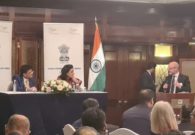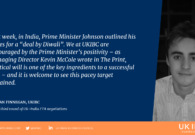A balanced UK-India FTA by year end: What reduction of BCD for Scotch whisky has in store for India?
After a positive visit of Prime Minister Boris Johnson to India last month, the third round of FTA negotiations between the UK and India has just finished in New Delhi.
The UK and India are important economic and political partners and so it matters to both businesses and consumers that our governments are negotiating an FTA with extensive scope to expand UK-India trade and investment relationship. In the food and drink sector lower tariffs, aligned standards, simpler customs procedures, and investor protections will create jobs and growth, across both countries, expand exports, and consumers will benefit from lower prices and greater choice.
What would make the biggest difference for the Food and Drink Sector?
In the food and drink sector, the principal impediment to market access into India remains high Basic Custom Duty (BCD) on imported food and drinks. Import tariffs on consumer food products range from 0 to 150 percent.
Therefore, phased reduction of the duty burden on premium spirits including Scotch, which currently stands at 150%, would make a significant difference and provide benefits to both countries. . Currently a combined duty burden of 150% from the BCD and Agriculture, Infrastructure, and Development Cess (AIDC) is imposed on the landed value of imported bottled-in-origin (BIO) and bulk spirits, which constrains growth, investments and job creation.
Economists generally agree that lower tariffs increase the overall level of economic output and income. In line with this thinking, this high tariff deters investment in Indian manufacturing and bottling facilities, and limits the choice available to Indian consumers. Recent years have seen significant UK investment in the domestic spirits sector in India, with British companies supporting innovation, value creation and driving the globalisation of iconic Indian brands.
This high rate of duty also negatively impacts Indian businesses as it increases the price of Bottled-in-origin (BiO) and bottled-in-India (BII) products in the Indian market. The majority of the Scotch Whisky imported into India comes in bulk, and not bottles. And a significant part of it goes into making Indian made foreign liquor (IMFL). If the tariff is reduced from 150% Indian whisky companies will have access to high quality ingredients at lower prices, which will further be passed on to Indian consumers.
What can we learn from the India- Australia Economic Cooperation and Trade Agreement (ECTA)?
The India – Australia ECTA might hold some clues for trade partners seeking real market access for the sector. India has signalled some willingness to reduce BCD in the wines and spirits sector. The India – Australia ECTA only provided a degree of preferential tariff access for wines over a value threshold. However, many wines imported from Australia, the United States, and European Countries fall below those thresholds and so will not see any tariff reduction.
Given the high mutual-dependency shared by the UK and Indian Alco Bev sectors, I expect the level of ambition in the India – UK FTA to be higher than was delivered in the India – Australia ECTA.
Real benefits to Indian consumers and to business from both countries can be achieved if there are no price caps linked to future tariff reductions in the Alco Bev sector.
Who Benefits from a BCD Reduction?
An India–UK FTA has the potential to be a win-win; a win for both countries and a win for businesses, consumers and State Governments in the form of greater taxes.
A tariff reduction by India will help to bring into India a premium segment of wines and spirits that can grow the market for all players, including growth of the hospitality and tourism market.
The tariff reduction will also reduce the costs of Indian Alco Bev companies who import bulk Scotch as an ingredient in their own blends, and it would increase investment and job creation in India as these Indian companies grow.
Investments in India by UK companies would also grow as there would be more bottling of bulk Scotch whisky in India.
As well as benefitting from lower costs, consumers in India would also enjoy greater choice as niche brands will enter the market.
Governments and tax authorities would benefit too. Modelling by the Scotch Whisky Association (SWA) suggests that the phased reduction of the import tariff could lead to an increase of £3.4 billion in revenue to the Indian Government, both at the Centre and the States. This clearly demonstrates huge potential for a win-win for both countries.
Little Known Facts about UK-India alcobev trade
While the 150% duty obligation is well known, there are important facts that are not fully understood.
For example, the UK has not levied any tariffs on Indian spirits since the 1990s. As a result, several Indian brands are selling well, and at high prices in the UK.
It is also thought that a reduced tariff will flood India with Scotch. The truth is that there is simply not the capacity in Scotland to produce significantly more. Production of Indian whisky alone is 2 ½ times the size of the entire Scotch whisky production.
And, according to industry sources, even if exports of Scotch to India were to double as a result of the FTA – and there is not capacity to do this – it would still be less than the projected 5 per cent annual growth in Indian whisky sales up to 2025.
It is also worth noting the legal definition of ‘whisky’ in the UK. In line with a globally agreed definition, adopted by over 70 countries, products sold as ‘whisky’ in the UK must be produced entirely from cereals and matured for at least three years. As noted above, Indian brands that meet these requirements have been sold in the UK at premium prices, often higher than the competing Single Malt Scotch Whisky brands. This is in stark contrast to Australia, where products that do not comply with these are banned.
The Role of Indian States
The States themselves have prioritised improving ease of doing business in the sector in recent years. One example of this welcome trend is the decision of the State of Maharashtra to halve its tax applied to imported spirits from 300% to 150%, a move aimed at increasing tax revenues and tackling counterfeit products. The SWA believes that a successful India-UK FTA would support States to develop their excise policies in order to deliver more jobs in tourism and hospitality, increase tax revenues and wider consumer choice as more niche brands (both Indian and imported) become available in the market.
So, three negotiating rounds have brought great progress and, as I have set out, the UK-India FTA can deliver real benefits to both countries. In this negotiating process, and beyond, it is important that governments and businesses continue to work hand in hand to ensure the potential benefits are realised, including those benefits to consumers

 By Shubhi Mishra
By Shubhi Mishra 




